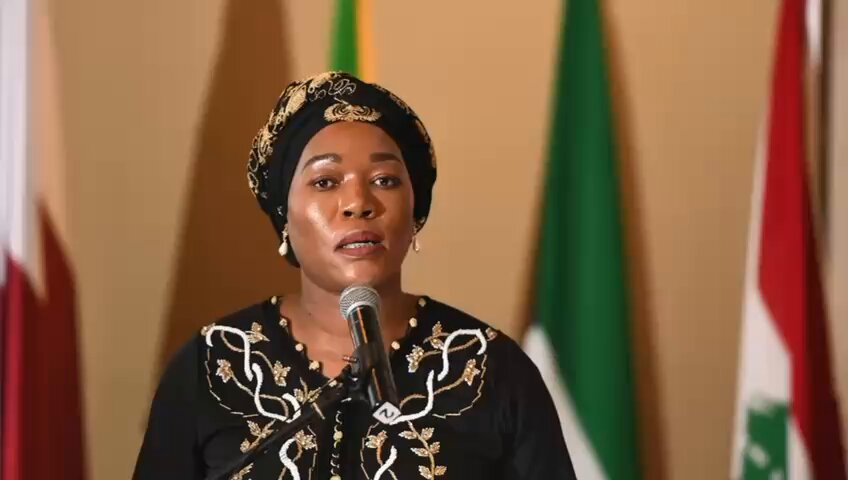Programme Director, Dr Maureen Tong
Principal & Vice-Chancellor Professor Puleng LenkaBula,
Moderator & Esteemed Panellists,
Recipient of the Oliver Tambo Ubuntu Award for Diplomacy, Ambassador Nhlapo Ambassador Mxakato Diseko, Ambassador at Large
Intelligentsia of UNISA, and International Relations Scholars
Members of the South African Foreign Service
Miss K Mochawe, Deputy Secretary General of the National Student Representative Council and the Student-body at large

Nelson Mandela In 1998, on the occasion of 53rd United Nations General Assembly, convened in New York – United States said the following “In reality, no rational answer can be advanced to explain in a satisfactory manner what, in the end, is the consequence of Cold War inertia and an attachment to the use of the threat of brute force, to assert the primacy of some States over others”.
On this day, 6 August, 80 years ago, the world witnessed its darkest scientific achievement: the atomic bombing of Hiroshima. Three days later, Nagasaki was also bombed. Those blasts did not merely destroy cities. They ruptured the conscience of humanity. Today, on the 80th anniversary of the Hiroshima bombing and this year on the founding of the United Nations, we are called not just to remember but to act—to reflect on the progress made in the progressive realisation of the global nuclear non- proliferation and disarmament legislative and policy architecture. Equally we should also confront the challenges, weaknesses and threats, that also continue to define the nuclear disarmament regime. Therefore this commemorative seminar, jointly hosted by
1
UNISA and the Department of International Relations and Cooperation (DIRCO), cannot be merely academic. It should be a reckoning with history and a necessary interrogation of power. We are assembled here in the shadow of present-day genocide in GAZA and wars—in, Ukraine, Sudan and Syria amongst others—where at times it feels like the silence of global governance is louder than the cries of victims. In these conflicts, the architecture of peace built after World War II seems to be fracturing.
The United Nations was born in the ruins of war to ensure peace through cooperation. It’s very first General Assembly resolution—Resolution 1(1) of 1946—called for the elimination of nuclear weapons. 80 years later, those same weapons remain not only in existence, but in modernised form, deployed in hardened bunkers, and whispered in the strategic doctrines of some states claiming moral and ethical authority.
At the centre of the global nuclear regime stands the Treaty on the Non-Proliferation of Nuclear Weapons (NPT), adopted in 1968 and entering into force in 1970. Unfortunately, the NPT is perceived by many in the global south as resting on a delicate and unfair bargain: five states—the United States, Russia, China, France, and the United Kingdom—were recognised as Nuclear Weapon States (NWS), while all others were expected to forgo nuclear weapons in exchange for the promise of disarmament and access to peaceful nuclear energy.
Today nearly every member of the United Nations—191 countries—has joined the NPT. Yet three states—India, Pakistan, and Israel—have never signed it. North Korea claims to have withdrawn in 2003. These four countries all possess nuclear weapons, with Israel maintaining a policy of “strategic ambiguity,” despite a growing historical body of evidence of an undeclared nuclear arsenal. And yet, while NPT signatories are routinely scrutinised and penalised, Israel’s nuclear status remains largely unchallenged, protected by the veil of Western geopolitical alliances. Unfortunately it is this type of multilateral double standards that strikes at the very credibility of the treaty.
For many in the Global South an important but difficult question is why do we, as the international community, demand non-proliferation from some while rewarding impunity to others? How do we reconcile the call for restraint in the Global South while
2
NATO states shelter under nuclear umbrellas and modernise their arsenals? This is hypocrisy and double standards and nuclear apartheid—that South Africa has long decried.
SouthAfrica’sownexperiencestandsasamoralcompassinthesedebates. Youwould recall the apartheid regime developed a covert nuclear weapons programme, supported tacitly and, at times, explicitly, by Western powers and Israel. It constructed six fully operational warheads and a seventh in development. South Africa then dismantled its nuclear arsenal.
The ANC-led government, after gaining power in 1994, fully embraced a strategy of disarmament and non-proliferation without fear or favour. This is because the ANC-led government’s foreign policy had, since 1955, always included support for nuclear non- proliferation and disarmament. The ANC foreign policy, as encapsulated in the Freedom Charter which turned 70 on the 26th June this year, has always been premised on the principle that we are anti-war and pro-peace—that we believe in peace and friendship, and the peaceful resolution of conflict, with multilateralism, human rights and the international rule of law at its centre thus nuclear disarmament and non-proliferation was in the ANCs governments DNA.
We joined the NPT as a non-nuclear-weapon state after dismantling our weapons. We helped establish the African Nuclear Weapon-Free Zone through the Pelindaba Treaty. We supported the African Commission on Nuclear Energy. And we were among the first 50 states to sign and ratify the Treaty on the Prohibition of Nuclear Weapons (TPNW), which entered into force in January 2021. Today, South Africa is honoured to serve as the elected President of the TPNW and will preside over its first Review Conference in 2026.
Yet, while we are rightly critical of the failures, we must also acknowledge and analyse the progress made. Over the past five decades, the NPT has arguably helped prevent the rapid proliferation of nuclear weapons, limiting the number of nuclear-armed states far below the many predictions made in the 1960s. Dozens of countries that once pursued or considered nuclear weapons programmes—such as Brazil, Argentina, South Korea, and Libya—eventually abandoned these pursuits, in part due to the normative weight
3
and institutional mechanisms of the NPT framework. The International Atomic Energy Agency (IAEA), created in 1957 and strengthened through its role under the NPT, has become a vital institution in verifying compliance and facilitating the peaceful use of nuclear energy.
Moreover, the NPT has given birth to an interlocking network of norms and treaties that comprise today’s disarmament architecture. These include the Comprehensive Nuclear-Test-Ban Treaty (CTBT), which although not yet in force, has established a near- global norm against nuclear testing; the Chemical Weapons Convention (CWC); the Biological Weapons Convention (BWC); and multiple regional nuclear-weapon-free zone treaties in Latin America (Tlatelolco), Africa (Pelindaba), Central Asia, Southeast Asia, and the South Pacific. These instruments have helped embed disarmament into the legal and policy fabric of international relations, shaping expectations, restraining ambition, and building a foundation for eventual abolition. Additionally, we have seen encouraging signs from various international and civil society-led initiatives, such as the Humanitarian Initiative, the Vienna Process, and the ICAN-led movement that culminated in the adoption of the TPNW in 2017. These efforts reflect a shifting global consensus: that the humanitarian consequences of nuclear weapons render their continued existence morally untenable and legally indefensible.
Despite this, today we are still witnessing a quiet arms race. Nuclear-armed states are not disarming; they are upgrading. Doctrines are shifting from deterrence to warfighting scenarios. Military budgets are ballooning. And the non-nuclear majority of the world— especially the Global South—is once again asked to trust a system that marginalises our voice and risks our future. The NPT is therefore in danger of a credibility crisis not because of its spirit and principles, but because its implementation has been selectively enforced. Non-nuclear states are expected to comply in full, while nuclear-weapon states reinterpret, delay, or dilute their commitments. The Eleventh Review Conference of the NPT, to be held in 2026, must be a turning point. If not, the erosion of trust in the treaty may become irreversible.
Equally, while we acknowledge and commend the definite but incremental progress we have made in terms of non-proliferation and disarmament policy architecture. We must
4
confront and constructively critique the challenges and inherent weaknesses of the treaty regime. This includes the lack of an enforcement mechanism for disarmament, the absence of timelines or binding milestones, the silence on non-signatory states with nuclear capability—such as Israel, North Korea, India and Pakistan—and the failure to hold nuclear umbrella states—such as Japan, Australia, South Korea, and NATO members—accountable for entrenching reliance on nuclear weapons. Moreover, we must reject the myth that the NPT and TPNW are mutually exclusive. They are not. The TPNW fills a critical legal and moral gap by explicitly prohibiting the development, testing, possession, and use of nuclear weapons. It stigmatises what should never have been normalised. And it reaffirms the inalienable right to peaceful uses of nuclear energy, as outlined in Article IV of the NPT—a right that many in the Global South find increasingly constrained by restrictive export controls, politicised approvals, and discriminatory standards.
South Africa continues to advocate for a nuclear-free world not only because it is just, but because it is necessary. Nuclear weapons do not exist in isolation—they exacerbate global inequality, prolong militarism, and divert resources away from development, health, and education. Today, the pursuit of disarmament is not a luxury. It is the foundation of any genuine international order rooted in the rule of law and the principles of equality , fairness, accountability and justice.
The world stands at a critical conjuncture. We are watching the erosion of the international rule of law in real time. We see nuclear posturing in Europe, strategic escalation in the Indo-Pacific, and the genocidal blatant disregard for civilian life in Palestine. At the same time, new wars rage in Africa, often fuelled by foreign interests, arms sales, and the echoes of a post-Cold War rivalry. We cannot afford silence. South Africa’s position is resolute: peace, security, friendship, development, international cooperation, diplomacy, multilateralism, international law and human solidarity and human rights must be the pillars of our global security system. We must reject the false binaries of might versus vulnerability. We must reject the moral relativism that tolerates
5
weapons of mass destruction in the hands of some while criminalising them in others. We must reject the idea that peace can be built on the promise of mass death.
Let me conclude where I began—in Hiroshima. The survivors, the hibakusha, have spent their lives bearing witness. They remind us that peace built on the threat of annihilation isnopeaceatall.Today,wemusthonourthemnotwithwords,butwithaction. Moving forward let us find ways to dismantle the architecture of nuclear hypocrisy. Let us build a new architecture of disarmament and non-proliferation , rooted in security, stability, equity, transparency, justice equality fairness and accountability. Let us remember that the greatest legacy we can leave for the next generation is not power, but peace and friendship.
South Africa joined the Non-Proliferation Treaty (NPT) in 1991 as a non-nuclear-weapon State. The NPT opened for signature in 1968 and came into force in 1970. The Non- Proliferation Treaty recognises the existence of two classes of States, Nuclear Weapon States (NWS) and Non-Nuclear Weapon States (NNWS), each with their own rights and obligations under the Treaty. Under the NPT, both the Nuclear Weapon States and Non- Nuclear Weapon States, has unique rights and obligations. Non-Nuclear Weapon States have stringent nuclear non-proliferation obligations while the Nuclear Weapon States also have nuclear disarmament obligations.
Does the concept of “common but differentiated responsibilities” (CBDR) exist in any this particular multilateral regime, especially regarding the NPT? How is it expressed?
Common responsibility to reduce the risks of nuclear use
States have common but differentiated responsibilities around nuclear weapons, including for nuclear risk reduction, non-proliferation, and disarmament.
I thank you.
